Photographs: Reuters Surabhi Agarwal in New Delhi
Demand for PCs has been affected by tablets, forcing Indian companies to stop making computers. But they may find solace in the fact that the tablet market is fast maturing.
Steve Jobs may have been proud to know how he has changed the dynamics of Nehru Place in New Delhi, one of Asia’s biggest electronics hubs.
Go there any day, and you will find a cacophonous market that screams out to anyone wanting anything that has to do with computing.
Desktops, laptops, printers, tablets, software - pirated as well as genuine stuff - accessories, all needs are catered to in this market.
Vendors spill into the crowded lanes and shout out to potential customers, enticing them not just with cheap ‘saftware’ and ‘laptap’ but also ultra-slim ‘teblets’ and their accessories.
In all this colourful chaos, you may not spot the exclusive showroom of HCL, India’s home-grown information technology company.
It looks positively calm amid all the frenzy around. It lacks the vivacity of other stores in the neighbourhood.
...
Tablets spell death knell for PCs
Photographs: Courtesy, HCL
Some laptop models sit on the display shelves. One buyer comes in looking for a pair of headphones, another wants portable speakers.
The staff is more than helpful - the shop owner himself leaps out to assist them. The co-owner, however, looks sombre.
HCL Infosystems went public in November last year with its decision to stop manufacturing computers. The business will be wound up by middle of next year.
“Well, we do stock other brands too,” the co-owner says, explaining why the HCL storeroom is still running. He then rattles off names of some familiar multinational computer manufacturers. “We will be fine, plus HCL tablets are doing well,” he adds, sounding more reassured.
It was in 2010 that Jobs unveiled the first tablet, the iPad, that his company, Apple, had created, putting the computer’s basic features into a form that was conveniently light and portable.
...
Tablets spell death knell for PCs
Photographs: Reuters
The iPad sold in millions and every computer maker came up with its own version. Even phone makers started incorporating the tablet’s features into smartphones, making the processors more muscular, the screens bigger, the cameras more sophisticated.
Apps for tablets enhanced the device’s utility to consumers. And there was a thirsty public waiting to lap everything up.
For the domestic PC makers, it was not just the popularity of the tablet that led to their decline.
It was a combination of factors such as the onslaught of foreign PC vendors, a weak economy and a fluctuating currency that bled their balance sheets in the past two years.
The overall computer market in India, including desktops and laptops, stood at 3.24 million units in the September quarter of 2013, according to consultancy firm IDC India.
In comparison, last year, the Indian tablet market was estimated to sell 1 million units per quarter.
...
Tablets spell death knell for PCs
Photographs: Reuters
End of PC era
HCL’s announcement that it would stop making PCs was followed by a similar one from Bangalore-based Wipro, which too has decided to down shutters on its branded PC business.
It is believed that RP Infosystems, the marketer of Chirag computers, is also phasing out its business.
Just six years ago, HCL was the second largest PC (desktop plus laptop) producer in the country. IDC says HCL had a market share of 13 per cent in 2007, the biggest after HP, which led by 21 per cent.
That was a time when desktops were popular and laptops were just becoming a phenomenon. By the second quarter of 2013, three years after the advent of tablets, HCL's market share had dropped to under 3 per cent, according to market research and consultancy firm Gartner Inc.
According to IDC, HP currently leads the market with a share of 32.3 per cent, followed by Lenovo 13.6 per cent and Dell with 11.8 per cent.
...
Tablets spell death knell for PCs
Photographs: Reuters
HCL has started selling tablets and phablets (phones with some tablet capabilities) in a bid to reinvent itself.
But in comparison to PC sales, the margins in these categories are low, and as far as manufacturing in India is concerned, it may not be feasible right now as there is no component industry in the country and even the international players are importing products and selling them here or are only assembling them here.
Explaining how the emergence of the tablet and the financial clout of foreign companies hurt Indian PC companies, Vishal Tripathi, principal research analyst at the India office of Gartner, says foreign vendors came and invested heavily in marketing and increasing their reach in India.
“Their visibility grew and slowly the market for domestic vendors was destroyed,” he says. The weakening of the global economy affected everyone, but the MNC players had the cost advantage of volumes because they operate in many countries. The growth in their market share, and the consequent hit that Indian companies took, is all too clear.
The last two years have also seen an array of small companies entering the PC market, offering tablets and phablets at unbelievably low prices.
These are mostly players who import products in bulk from China and Taiwan and sell them at rock-bottom prices in India without investing too much in sales, marketing or service.
According to IDC India, while companies like Apple and Samsung operate in a niche segment, 70 per cent of the tablets sold in the country fall in the below-$200 price range and are mostly of Chinese, Taiwanese or local make.
...
Tablets spell death knell for PCs
Photographs: Reuters
PC isn’t dying
Things may, however, change for the serious PC players now. Sumanta Mukherjee, principal consultant, CyberMedia Research, says that the tablet market is maturing now.
“The period for impulse buying is over,” he predicts, saying that purchasing a tablet for its novelty factor or simply for accessing the Internet no longer drives the tablet market.
Mukherjee also says that the PC has emerged as a clear differentiator in terms of productivity, and only people with casual computing needs will opt for a tablet. “It will be difficult to knock down the PC,” he says with a quiet certainty.
Tripathi of Gartner agrees, but adds that there still is a huge number of people who have just casual computing needs.
The demand for PCs may recover in the next few years but new form factors will continue to drive the show.
Debjani Ghosh, South Asia managing director of chipmaker Intel, told Business Standard recently: “Till now, people didn’t have choices if they wanted to buy a low cost device in India. As brands come into play, you will realise that there is a desperate need for brand reassurance in that segment.”
In the meanwhile, affordable tablets could help branded PC players stem some of their losses. The market is expected to pick up in 2014 with improvement in the economy and the customer sentiment.
Moreover, the upcoming general elections and some large orders from state governments are also expected to boost demand. PC showrooms in Nehru Place may become more cheerful places again.
...
Tablets spell death knell for PCs
Image: Ajai Chowdhry, co-founder of HCL InfosystemsPhotographs: Reuters
‘We didn’t realise then that we were world leaders in computer making’
Ajai Chowdhry, co-founder of HCL Infosystems talks about the making of the first computer.
It was 1976 that we started HCL. Six of us left DCM (Data Products) to start HCL. We were in the electronics business at DCM and were toying with the idea of launching a microprocessor that would make it easier and cheaper to make a computer.
Those were the days of the licence raj, so we formed a joint sector undertaking with the UP government, which had a licence for manufacturing computers. That is how Hindustan Computers Ltd was born. It later became HCL Infosystems.
We first picked a 4-bit microprocessor and fabricated a scientific computer. Then when Intel released the 8-bit microprocessor, we made our first commercial PC computer around the same time as Apple. We didn’t realise it at the time that we were world leaders in this area.
Around 1993-94 things changed. Rajiv Gandhi introduced the new policy of computerisation, prompting us to introduced an IBM-compatible PC as we could now import technology.
...
Tablets spell death knell for PCs
Photographs: Reuters
Earlier, we had to design our own operating system, hardware, and the other accessories.
That PC, which we called BusyBee, became the first in our journey. BusyBee is the longest surviving PC brand of India and continues to exist.
Those days there must have been a total of 100 computers in the country. Therefore, to go and sell computers to the public was very tough - we had to sell the whole concept of digital life.
IIT Kharagpur was our first customer in the scientific area. In the commercial space, our first computer was bought for a legal firm by somebody called Jyoti Sagar.
Now, that person runs his own company called J Sagar Associates. I cannot remember exactly, but the first computer we sold was priced somewhere between Rs 80,000 and Rs 1,00,000.

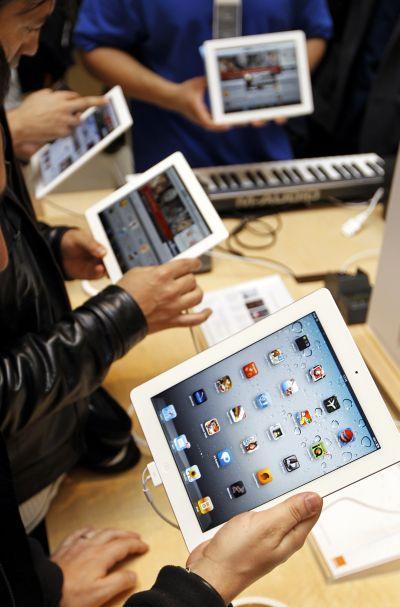
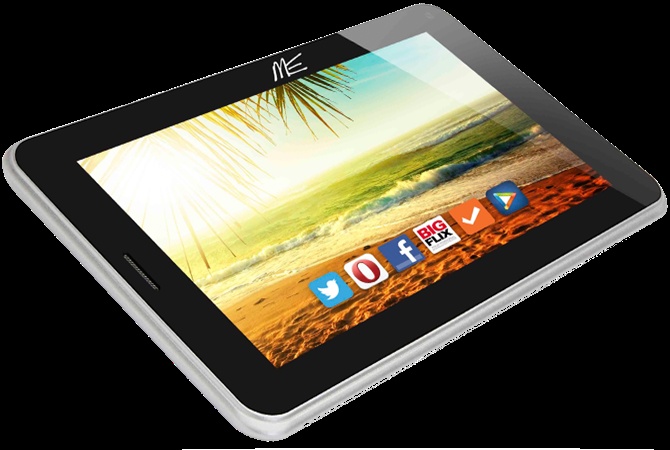
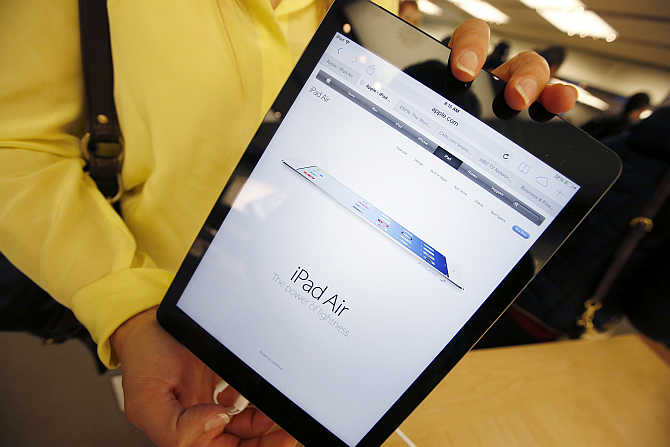
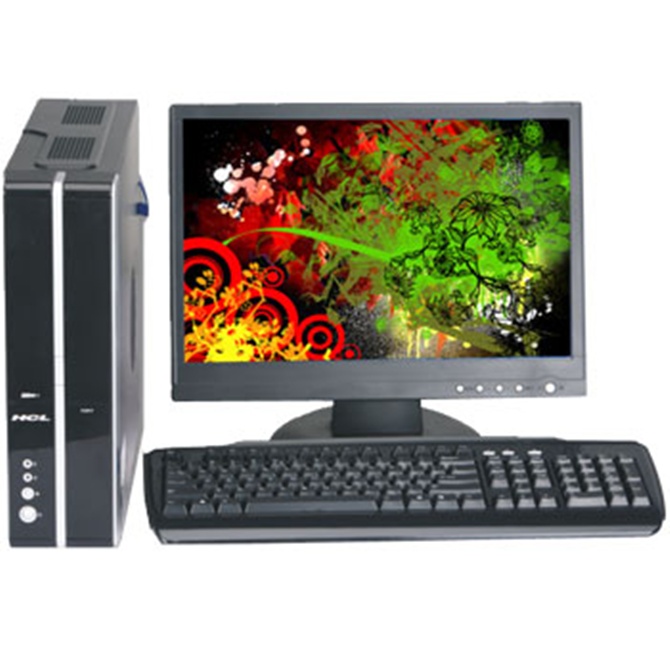
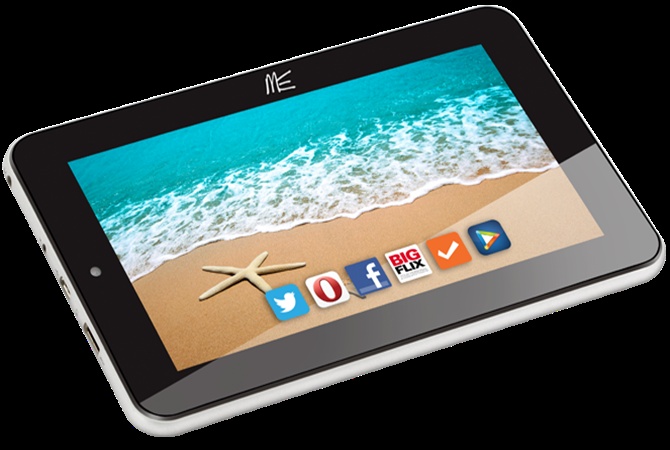
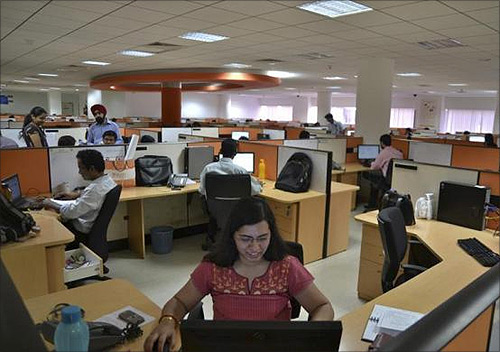
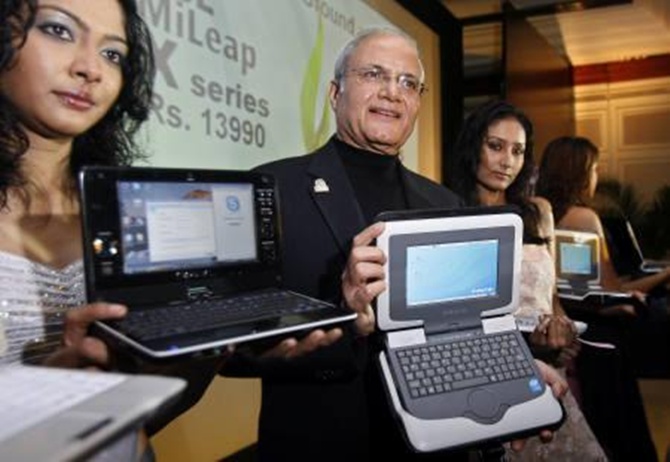
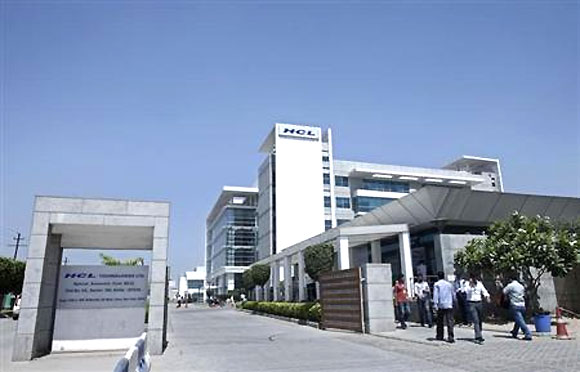

article